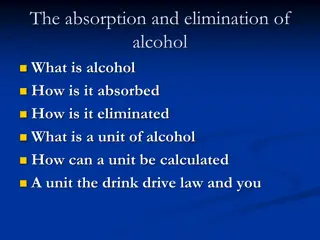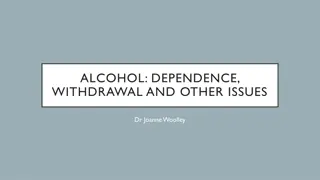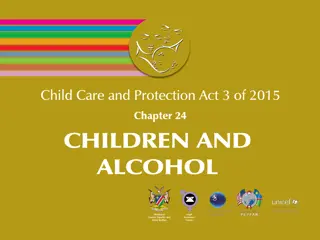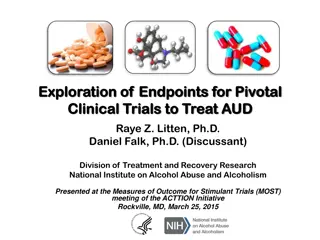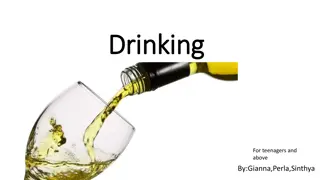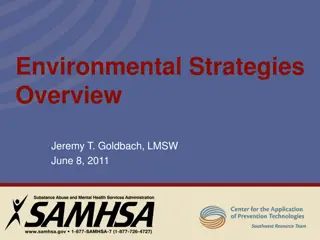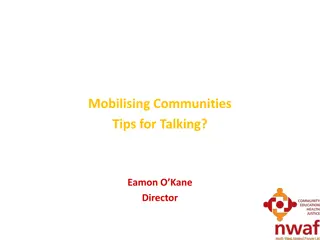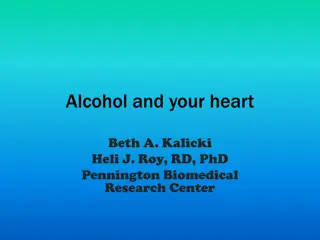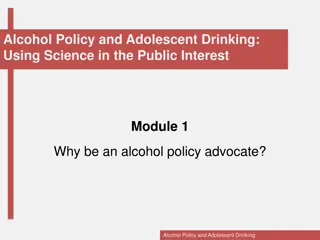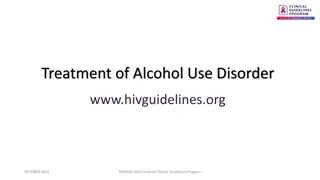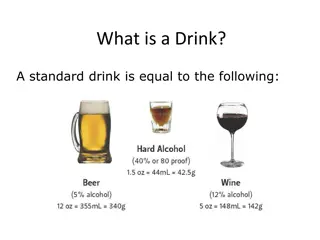Understanding Alcohol: Risks and Consequences
People drink alcohol for various reasons, but it's important to understand the risks involved. Short-term risks include unplanned sex, violence, lower grades, impaired cognitive abilities, and driving accidents. Knowing how alcohol impacts behavior and decision-making can help prevent negative consequences. It's crucial to make informed choices and prioritize safety when consuming alcohol.
Download Presentation

Please find below an Image/Link to download the presentation.
The content on the website is provided AS IS for your information and personal use only. It may not be sold, licensed, or shared on other websites without obtaining consent from the author. Download presentation by click this link. If you encounter any issues during the download, it is possible that the publisher has removed the file from their server.
E N D
Presentation Transcript
Party Safe: Know Your Drugs and Alcohol Part I: Alcohol
Alcohol People Who Drink Alcohol Say They Do It ... To have a good time To celebrate Because they like the taste Because they like how it feels to drink/get drunk To reduce anxiety or tension To reduce depression or emotional pain To feel more socially relaxed or more sexual Not surprisingly, no one says they want to drink because they like throwing up, getting arrested or winding up in the emergency room. What people enjoy about drinking is what happens within the first few drinks. Of course, many people use alcohol safely without major issues. But others drink in ways that cause negative consequences, either in the short term or to their long-term health. So if you choose to drink, know the risks. Think about how many times things happen that you DON'T like and ask yourself what you can do to make safer choices. Read on for some tips about how to do that.
Alcohol: Short Term Risks FACT: Many college students say they had unplanned sex because of drinking or that they had sex they wouldn't have had if they'd been sober. WHY SHOULD YOU CARE? Planned sex can be fun and meaningful, but unplanned sex is usually neither. Unplanned sex can lead to STIs, pregnancy, embarrassment, regrets, emotional trauma and social consequences. Not exactly a turn on! FACT: Alcohol is involved in the majority of campus rapes. WHY SHOULD YOU CARE? Being drunk makes it more likely you could pressure, manipulate or force someone into having sex when they don't want to. This hurts the other person and could get you in trouble with the law and your school. Being drunk makes it more likely you could be pressured, manipulated or forced into having sex when you don't want to. This hurts you.
Alcohol: Short Term Risks, Cont. FACT: Alcohol makes some drinkers violent, leading to fights, destruction of property, verbal conflict and other problems. WHY SHOULD YOU CARE? You could get kicked out of your dorm, kicked out of school, suspended or arrested. You might hurt someone or yourself. You could damage your social relationships and become known as someone who can't control their temper. FACT: Heavy drinkers consistently have lower grades. WHY SHOULD YOU CARE? Even though part of college life is having fun, it's also about learning and preparing for the future. It's not fun being on academic probation or, worse, flunking out. FACT: Just one night of heavy drinking can impair your ability to think abstractly and grasp difficult concepts for up to a month! WHY SHOULD YOU CARE? Got a big exam in a few days? You want to be ready to do your best, not stack the cards against yourself so you might do badly. Heavy drinking impairs your ability to think, and how can you do well in school if you can't think straight? FACT: Drinking impairs your ability to drive. WHY SHOULD YOU CARE? If you're drinking and driving or riding with a driver who has been drinking, you could get in legal trouble, crash your car, get hurt or killed or hurt or kill someone else.
Alcohol and Drugs: A Dangerous Mix Is it dangerous to use other drugs while drinking alcohol? It can be. Read on for more info ... POT: Using alcohol with pot can greatly impair your ability to drive. Because pot suppresses the gag reflex, you may not be able to throw up alcohol when your body needs to, which can result in alcohol poisoning. The alcohol-and-pot combo can make you more drunk and high than you intended, which can be scary. It can also result in nausea. SEDATIVES: Using alcohol with sedatives like GHB, Rohypnol, Ketamine, barbiturates, tranquilizers or sleeping pills will increase the sedative effects of both, which can slow down your central nervous system enough to cause you to black out, go into a coma or even die. Sedatives like GHB and Rohypnol have been used as date rape drugs because of this dangerous combination. Using sedatives with alcohol can also cause nausea and vomiting.
Alcohol and Drugs: A Dangerous Mix, Cont. OPIATES: Using alcohol with drugs such as heroin, codeine or Darvon slows down the central nervous system and can cause your breathing to stop, coma and even death. PRESCRIPTION DRUGS: Many medications interact harmfully with alcohol. When you drink alcohol and take medicines that depress the central nervous system, such as sleeping pills, antihistamines, antidepressants, anti-anxiety drugs and some painkillers, you could stop breathing, go into a coma or even die. In addition, medicines for certain disorders, including diabetes, high blood pressure and heart disease, can have harmful interactions with alcohol. Using alcohol with some prescribed drug or over-the-counter drugs may cause liver damage. Heavy drinking (more than 2 drinks a day on a regular basis), especially combined with not eating enough and taking medications, can be especially damaging to the liver. Also, because alcohol is a depressant, it may counteract some of the benefits of antidepressant medications. Call your pharmacist to ask about using alcohol with any prescribed drug or over-the- counter medication.
Do You Have a Problem With Alcohol? It can be hard to judge whether your alcohol use is "normal" or problematic, especially if your friends seem to drink as much or more than you do. Here are some ways to figure out if you have a drinking problem.
Do You Have a Problem With Alcohol: Cont. It can be hard to judge whether your alcohol use is "normal" or problematic, especially if your friends seem to drink as much or more than you do. Here are some ways to figure out if you have a drinking problem. ABUSE (alcohol abuse occurs when you use alcohol in ways that cause negative consequences) You usually drink to get drunk. You have a hard time stopping after a couple drinks You have had negative consequences from drinking (e.g., legal issues, health issues, blackouts, unwanted sex, relationship problems, violence, missing class or work, doing poorly in school) but continue drinking in the same ways that have been causing the problems. You almost always have a hangover the day after drinking.
Do You Have a Problem With Alcohol, Cont. II You have trouble remembering what you did while drinking. You feel guilty about your drinking or regretful about things you have done because of drinking. Others have expressed concern or annoyance about your drinking. You often drink alone or "sneak" drinks. You drink at times when it's not smart or safe (e.g., before an exam, before driving). You sometimes stay drunk for several days in a row or drink in the morning to "cure" a hangover. You need to drink to fall asleep or relax and don't have any healthier tools (e.g., relaxation exercises, physical activity) for these purposes. If more than a few of these apply to you, you may have a drinking problem. You might want to consider talking to a trusted friend or relative or a counselor to get help.
Addiction/Alcoholism Alcohol addiction/alcoholism occurs when you have a physical addiction to alcohol; i.e., when you have developed a higher tolerance for alcohol and need more to get the same effects and when you have withdrawal symptoms after stopping drinking. You need to drink more to get the same effects you used to get from drinking less (e.g., it takes more drinks for you to feel drunk, you can "handle" more alcohol than before). When you stop drinking, you have "the shakes," feel extremely anxious or have visual or auditory hallucinations. RISK FACTOR: A close relative (e.g., parent, grandparent, biological aunt or uncle) is an alcoholic, which may mean you have a genetic predisposition to becoming one too. If you have experienced these symptoms, it is important to seek help from a medical professional and consider talking to a counselor about alcohol recovery programs.
Have Fun and Avoid Problems When Drinking by Learning to Drink Smart If you choose to use alcohol, lower your risk of negative consequences: Reduce social and legal consequences and the harm to your liver that can result from drinking by avoiding heavy use. If you are a man, drink no more than 2 drinks/day; if you are a woman, drink no more than 1 drink/day. One drink = 12 ounces of regular beer (less if it's an ale with a higher alcohol content), 5 ounces of wine or one shot (1-1.5 ounces) of hard liquor. Know your limits: Don't drink more than is healthy for your size and tolerance, and don't drink quickly or heavily if you are new to drinking. You may have a bad experience and could even die of alcohol poisoning. Before you go out to a party or bar, decide how much you should safely drink, and stick to it. Only take enough money for a couple drinks, and leave your ATM and credit cards at home. Don't do shots or keep filling up your beer cup before it's empty--it makes it much harder to know how much you've had. Avoid drinking games and "chugging"--drinking games and drinking fast are sure ways to have too much. Don't succumb to peer pressure to drink more, and don't pressure others. Drink water or soft drinks in between alcoholic beverages to slow down your alcohol intake and fill up your stomach. Eat before drinking alcohol. When you drink on an empty stomach, you risk drinking too much or getting drunk faster than you expected.
Have Fun and Avoid Problems When Drinking by Learning to Drink Smart, Cont. If you drink, don't drive or do things that could be dangerous--your motor skills and coordination are impaired. This includes riding a motorcycle, bicycle, skateboard or scooter or driving a motorboat. Don't pressure someone drunk to have sex or get someone drunk intentionally so you can have sex--this is rape! Stick with friends who will encourage you do to do the right thing, not friends who will abandon you or encourage you to take advantage of others who are drunk. Avoid putting yourself in situations where you could get sexually assaulted--don't go home with a stranger when drunk. Stick with friends who will look out for you, and make sure your friends know your plans for the night. Do the same for your friends. Don't mix alcohol with over-the-counter, prescription or illegal drugs. The consequences can be dangerous. It's a myth that a cold shower or caffeine will "sober someone up." The only thing that works is time. Use the buddy system--go out with friends who will look out for you, and look out for them, too. Help each other avoid doing something stupid like walking home alone when drunk or drive after drinking. NEVER leave someone alone when they are very drunk--if someone is slurring, throwing up and about to pass out, DO NOT let them "sleep it off." They could have alcohol poisoning, which can be fatal. Get them to a hospital. Most schools have "good Samaritan" policies, which means that when you call for help for someone who is drunk, you won't get in trouble for being drunk yourself.

 undefined
undefined

